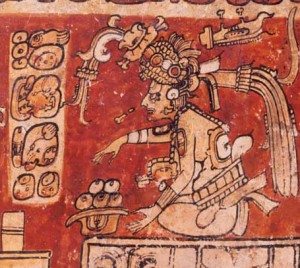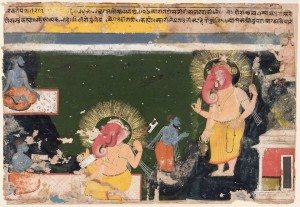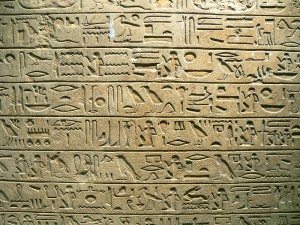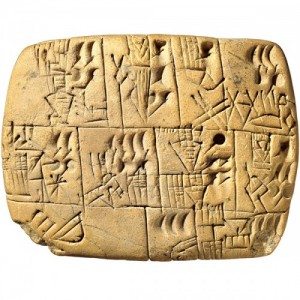The gods were responsible for teaching humans how to write. Without their divine involvement, it would have been impossible for us, imperfect mortals, to develop such a valuable and powerful skill. This, and other similar explanations, was the way that most ancient societies accounted for the existence of writing.
Itzamná, the Mayan god and ruler of heaven, was the inventor of writing in Mesoamerica, just like Odin in Norse mythology was the god who invented the runes. Thoth, the Egyptian god of wisdom and scribe of the gods, was responsible for the invention of Egyptian hieroglyphs. The Greek god Hermes (the Roman Mercury), related to the Egyptian Thoth by some Greeks, was the creator of the Greek alphabet. Even those Greeks who had a more rational explanation for the origin of the alphabet relied on a legendary figure who although was no god, was still mythical: Cadmus, the founder and first king of Thebes according to Greek folklore (Herodotus, 5.58).
The Devanagari script used in India has some traces of the divine in its name. In Sanskrit, deva means ‘heavenly’ and nagari means ‘script of the city’. Ganesha, the Indian elephant-headed god, was the protector of writers. It is said that the Mahabharata, the famous Indian epic, was written by Ganesha, while the poet-sage Vyasa dictated to him the long poem. Ganesha’s feather pen broke whilst trying to maintain the pace as Vyasa dictated the words to him. So important was this task, and so driven was Ganesha to complete it, that he broke off a piece of his tusks to use as a stylus to keep writing.
The Chinese also connected the creation of writing with the divine. Liu Xie (c. 465-c. 520) explained it in his book The Literary Mind and the Carving of Dragons:
Both the first sage Fu Xi, who invented writing, and Confucius, the “Uncrowned King”, who transmitted the teachings, drew their literary embellishment form the mind of the Tao, both of them taught by reference to divine principles […] From this we know that the Tao is handed down in writing through the sages, and that the sages make the Tao manifest in their writings […] Words are able to arouse the world because they are the Pattern of the Tao.
The origin and development of the different early writing systems were never recorded by the ancients. Therefore, there was a gap in their knowledge that attracted all sorts of mythical and supernatural explanations. Forces superior to humankind had to be behind the birth of writing, they thought. What other explanation could have been more reasonable to account for the origin of a medium of communication immune to the shackles imposed by spatial and temporal distances of speakers and listeners? That could transcend some of the limitations of speech and that enhanced, endlessly, the power of memory? How magical and powerful must the art of writing have felt, from the standpoint of our ancestors?
Could the similarities between these different stories on the origin of writing simply be a coincidence? Some might think that through contact between the different groups, the stories were borrowed and exchanged during their interaction. When we see such similarities between cultures that are so far apart, where neither direct nor indirect contact was possible, we might think that these resemblances are rooted in the fact that the human mind, faced with comparable explanatory challenges and under the influence of equivalent circumstances, will come up with similar answers.
The believers of the past assumed that writing was of heavenly origin, that we received it from a higher power. The skeptics of today claim that all these legends are nonsense and lies, that they are the invention of cunning priests and bureaucrats of ancient times. Some of us might be inclined to support the skeptics, because it seems likely that these legends were consciously created and edited throughout generations. It is also tempting to agree with those who believe that the origin of writing is so deeply buried in the human past that it does not seem to be connected with any human origin. Nevertheless, both believers and skeptics could be equally wrong. These legends of the Divine Gift of Writing could also be rooted in the spontaneous creative power of the human mind and be the involuntary offshoot of archetypal fantasies so far hidden beneath a thick layer of mystery that they cannot be considered intentional creations.
Images:
Image 1: http://commons.wikimedia.org/wiki/File:God_D_Itzamna.jpg, Itzamná in the Maya Book of the Dead, from Francis Robicsek: The Maya Book of the Dead. The Ceramic Codex, University of Virginia Art Museum (1981)
Image 2: http://commons.wikimedia.org/wiki/File:Ganesa_writing_the_Mahabharat.jpeg, Indian, Rajasthani, 17th century CE, Museum of Fine Arts, Boston.
Image 3: http://commons.wikimedia.org/wiki/File:Minnakht_01.JPG, Stele of Minnakht, chief of the scribes. during the reign of Ay (c. 1321 BCE), Louvre Museum.
Image 4: http://www.ancient.eu/image/576/, Early writing tablet recording allocation of beer, probably from southern Iraq, Late Prehistoric period, 3100-3000 BCE.



